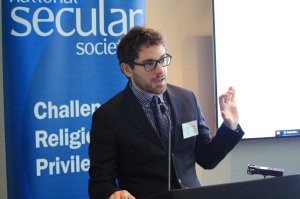We are committed to ending all forms of forced non-therapeutic genital cutting.
This includes female genital mutilation (FGM) and ritual circumcision of boys.
A child's right to bodily autonomy must not be overridden by other people's religious or cultural beliefs.
The National Secular Society supports a person's most fundamental right to grow up with an intact body and to make their own choices about permanent bodily modifications.
All forms of forced cutting on children's genitals breach basic child rights and safeguarding guidance.
Several communities have genital cutting traditions, often rooted in religious beliefs. But children, and particularly babies and young infants, are incapable of giving consent to such medically unnecessary, harmful, painful and permanent procedures.
Sometimes health benefits for non-therapeutic genital cutting are claimed despite the evidence to the contrary. All forms of forced genital cutting risk serious emotional, sexual, and physical harm – including death.
Child safeguarding must always be prioritised above the desire of adults to express their belief through forced cutting of children's genitals.
Female genital mutilation (FGM)
"It is irrelevant whether or not a person believed the operation to be necessary in the child's best interests as a matter of custom or ritual."
We are committed to the eradication of forced genital cutting of girls and women known as Female Genital Mutilation (FGM) in all its forms.
There are thought to be well over 100,000 women and girls affected by FGM living in the UK. We work with like-minded organisations to protect girls from the harm of forced genital cutting.
FGM practices vary. Some forms involve a pinprick or the removal of a small amount of tissue from the clitoris. Other forms include complete removal of the clitoris and labia, and stitching the vulva closed. Communities which practice FGM often cite religion as a motivation.
All forms of FGM are child abuse and are rightly illegal in the UK. But some British girls are still unprotected. Some have been sent abroad to undergo the procedure and others are having it performed secretly in this country.
There has been only one successful prosecution for FGM since it was banned in 1985. We are concerned that fear of upsetting cultural and religious sensitivities is preventing authorities from tackling FGM effectively.
"...a right specifically for African families who want to carry on their tradition whilst living in this country"
As with all forms of forced genital cutting, those who speak out against FGM are often accused of disrespecting their parents or cultural heritage, and of over-dramatising a 'minor' procedure that others 'don't complain about'. Together with the perceived humiliation of speaking about one's own genitals, these factors combine to ensure that many sufferers are reluctant to speak out.
Ending FGM requires sustained civil society action to change attitudes and inform girls of their rights.
Male circumcision
While all forms of FGM are rightfully banned, non-therapeutic circumcision of boys is permitted in UK law.
The foreskin is a normal body part with physical, sexual and immunological functions. Removing it from non-consenting children has been associated with various physical and psychological difficulties. These are likely to be greatly under-reported because people who have experienced sexual harm are often reluctant to reveal it as societal dismissal or stigmatisation may compound the harm.
Circumcision is excruciatingly painful. When performed on babies, little to no anaesthesia is used. Even when performed under anaesthesia on older children, the recovery entails weeks of pain and discomfort.
The procedure is also dangerous. Between 1988 and 2014, there were 22,000 harms recorded by the NHS resulting circumcision. They included scarring and full penis amputation. In 2011, nearly a dozen infant boys were treated for life-threatening haemorrhage, shock or sepsis as a result of non-therapeutic circumcision at a single children's hospital in Birmingham. In 2007, a newborn baby went into cardiac arrest minutes after he was circumcised in a London synagogue, and subsequently died.
Any claims of marginal health benefits of circumcision are extremely contested. No national medical, paediatric, surgical or urological society recommends routine circumcision of all boys as a health intervention. There is now growing concern among doctors that existing ethical principles of non-therapeutic childhood surgery should no longer include an exception for non-therapeutic circumcision.
62% of Brits would support a law prohibiting the circumcision of children for non-medical reasons. Only 13% would oppose it.
There is very limited regulation of non-therapeutic circumcision in the UK. We do not know how many such procedures are performed annually or the degree of harm, as there is no requirement for any follow up or audit and the boys themselves are too young to complain.
It is now being recognised more widely that non-therapeutic religious and cultural circumcision is a breach of children's rights. We want to see the same protections for girls' bodily autonomy extended to boys.
Take action!
1. Write to your MP
Ask your MP to support an end to non-consensual religious genital cutting
2. Share your story
Tell us why you support this campaign, and how you are personally affected by the issue. You can also let us know if you would like assistance with a particular issue.
3. Join the National Secular Society
Become a member of the National Secular Society today! Together, we can separate religion and state for greater freedom and fairness.
Latest updates
NSS: doctors shouldn’t collude in unnecessary child genital cutting
Posted: Fri, 25 Jan 2019 09:50
The National Secular Society has called on the body which registers doctors to "explicitly address" the harm caused by ritual infant genital cutting in guidance on decision making and consent.
Draft guidance from the General Medical Council (GMC) has endorsed the general principle of patient autonomy, including over patients' "future choices". It also says doctors should be aware of patients' vulnerabilities.
In a submission to a consultation on the guidance the NSS's Secular Medical Forum (SMF) welcomed the GMC's commitment to these principles. But the SMF questioned their compatibility with the council's position on circumcision.
Previously-issued GMC guidance has said doctors must consider "the child's and/or the parents' cultural, religious or other beliefs and values" when assessing whether circumcision is in a child's best interests.
The GMC's new guidance says: "Doctors have an ethical and legal responsibility to involve patients as much as possible in making decisions about their own health and care."
It also says doctors should act in a way which is "least restrictive of the patient's rights and freedoms including their future choices". And it adds that doctors should be aware when "patients may be particularly vulnerable".
But it does not mention ritual genital cutting.
SMF chair Dr Antony Lempert said: "Standalone, the draft GMC guidance is comprehensive and excellent. But it is discordant with existing GMC guidance which allows for parental beliefs to be a proxy consent for non-medically necessary surgery on children's genitals."
The SMF's submission said the guidance "sets out excellent guiding principles for use by doctors when making decisions with patients".
But it said the GMC should "explicitly" address child genital cutting so it "no longer allows parental beliefs, however strongly held, to be a determining factor in nonessential surgery on babies and children".
"We urge the GMC to reconsider the guidance in these other areas to remove the inconsistencies and ensure that all GMC guidance is concordant and maintains as the first concern of every doctor the care of the patient, and not the patient's parents or community.
"It is not sufficient to assert that certain religions or cultures require a certain practice. In most circumstances it is self-evident that the most vulnerable patients of all, i.e. small children and babies who cannot consent and who cannot defend themselves, are granted even greater protection than adults.
"Yet, in this one area, GMC guidance leads one inexorably to the conclusion that the GMC considers it acceptable to rely on parental beliefs as a proxy for a child's future beliefs.
"If ritual male circumcision is to be allowed by society, there is no reason for doctors to be involved. In fact, by following this excellent draft guidance, there is every reason for doctors to challenge societal acceptance of this practice by highlighting the many dangers rather than colluding with it."
The SMF also warned of the risk that vulnerable patients could be "put under pressure either by their family or community or by their doctor to choose a specific treatment".
It said guidance on children whose parents wish to refuse blood transfusions on their behalf, for example, should make explicit that parental consent "is valid only as exercised in the best interest of the child".
This would be in line with the Children Act of 1989, which makes clear that "the child's welfare" should be a court's "paramount consideration" in determining questions around children's upbringing.
The SMF also warned of the risk that vulnerable adults "may find it very difficult to seek independent medical advice and support" to understand the implications of choices they make under community pressure.
And the SMF's response recommended a specific reference to the importance of doctors distinguishing between "sincerely held personal, including religious, beliefs and their professional opinion".
Medical ethicist Brian Earp to speak at Secularism 2019
Posted: Wed, 16 Jan 2019 13:41
The National Secular Society is pleased to announce that cross-disciplinary medical ethicist Dr Brian D. Earp will address its Secularism 2019 conference on 'reclaiming religious freedom'.
Dr Earp, a research fellow at the University of Oxford and Yale University, will address children's right to bodily autonomy.
He spoke about infant genital cutting at the NSS's Healthcare and Secularism conference in October, when he argued that all children should be entitled to autonomy over their genitals regardless of their sex.
He also warned of an "imminent collision course" in law and policy regarding different ethical standards for female, male and intersex forms of genital cutting.
Dr Earp's interests include psychology, the philosophy of science and bioethics.
NSS chief executive Stephen Evans said Dr Earp would make an "excellent" addition to the line-up of speakers.
"Brian Earp's superb talk at our Healthcare and Secularism conference last year made a compelling case that all children should be given the chance to control their own bodies.
"Children's freedom to accept or reject religion when they are ready to do so is too often overlooked in debates over genital cutting. We're looking forward to hearing Brian develop his thoughts on this subject as an issue of both medical ethics and religious freedom."
Secularism 2019 will explore religious freedom as a right that belongs to everyone and which has limits when it impinges on human rights such as bodily autonomy and freedom of expression.
The other confirmed speakers include Sara Khan, the government's lead commissioner for countering extremism, and Dr Ahmed Shaheed, the UN special rapporteur on freedom of religion or belief.
The keynote address at the conference will be delivered by Rachel Laser, the CEO of the US-based campaign group Americans United for Separation of Church and State.




